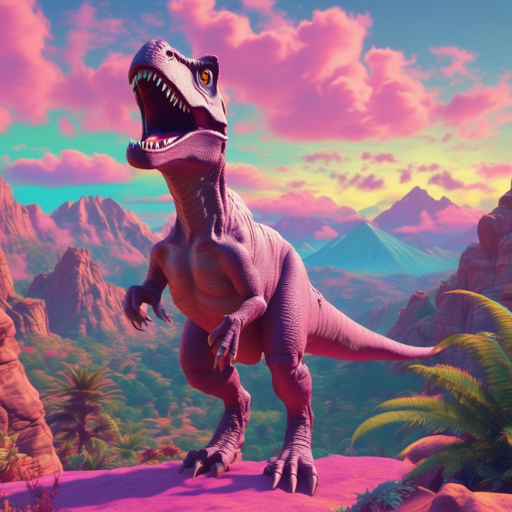This project is an evolutionary framework for optimizing Stable Diffusion XL models. It allows you to evolve a population of models through crossover, mutation, and selection based on their performance judged by a VLM.
| After Evolution | Before Evolution | Model |
|---|---|---|
 |
 |
Model A * |
 |
 |
Model B * |
 |
 |
Model C * |
After 10 cycles with prompt "T-Rex wearing aviator sunglasses, posing in front of a diffusion-generated Jurassic landscape, 80s vaporwave style, 4K"
* Images are paired with the closest model output from the initial population. All images share the same seed and diffusion settings. The VLM was not shown the prompt and default settings were used.
* Demo models are available here https://huggingface.co/martyn/sdxl-evolved-demo-models
More models are available here https://huggingface.co/collections/martyn/evolved-sdxl-models-660b9185df88d3dbac68c052
and on Civit.ai https://civitai.com/user/chandro/models
-
Clone the repository:
git clone -
Install the required dependencies:
pip install -r requirements.txt -
Set up the necessary API credentials:
- Obtain an API key from Anthropic.
- Set the
ANTHROPIC_API_KEYenvironment variable with your API key.
- A system capable of running inference on Stable Diffusion XL
- Hard disk space(7GB*(population_size+initial_population))
- A modern GPU
- A lot of ram(> 128 GB). More allows for larger population size
- A ramdisk to store the evolved population
To run the evolutionary framework, use the following command:
python sdxl-evolve.py model_list.yml [options]
The model_list.yml file should contain a list of initial model candidates in YAML format.
Available options:
-seed: Random seed for reproducibility.-cycles: Number of evolutionary cycles to run (default: 10).-elite: Number of elite candidates to keep in each iteration (default: 10).-parents: Number of parents for each child (default: 2).-population: Size of the population (default: 50).-mutation: Chance of mutation (default: 0.05).-output_path: Directory to save the results (default: "evolve_output").-eval_file: Text file containing prompts for evaluation (default: "evals.txt").-eval_samples: Number of samples to evaluate between candidates (default: 3).-vlm: The VLM to use, claude(default) or llava-append_prompt: Adds to the end of eval prompts-negative_prompt: Negative prompt in diffusion sampling-guidance_scale: Guidance scale for diffusion sampling-diffusion_steps: Number of iterations to diffuse with the candidate during eval-width: Generation width-height: Generation height-resize_width: Width to resize images after generation-resize_height: Height to resize images after generation
The framework consists of the following main components:
evolve.py: Defines the core evolutionary algorithm, including candidate representation, selection, crossover, mutation, and population management.merge.py: Provides functions for merging SafeTensor files to create new model candidates using DARE.sdxl-evolve.py: The main script that orchestrates the evolutionary process, including image generation, evaluation, and comparison using the VLM.
Candidate: Represents a model candidate with its file path, initial population flag, p-value, and lambda value.selection: Selects a subset of candidates as parents for breeding.mutation: Applies random mutations to an offspring candidate.breed: Performs crossover and mutation to create a new offspring candidate.evolve: Evolves the population by selecting parents, breeding offspring, and updating the population.run_evolution: Runs the evolutionary process for a specified number of cycles.load_candidates: Loads initial model candidates from a YAML file.write_yaml: Writes the population to a YAML file.generate_images: Generates images using a Stable Diffusion XL pipeline for evaluation.vlm_judge: Uses the VLM to compare and judge the quality of generated images.
- sakana.ai, Evolving New Foundation Models: Unleashing the Power of Automating Model Development: https://sakana.ai/evolutionary-model-merge/
- DARE, Language Models are Super Mario: Absorbing Abilities from Homologous Models as a Free Lunch: https://arxiv.org/pdf/2311.03099.pdf
- Stable Diffusion XL: https://github.com/CompVis/stable-diffusion
- Anthropic API: https://www.anthropic.com
- SafeTensors: https://github.com/huggingface/safetensors
Feel free to contribute, report issues, or suggest improvements!